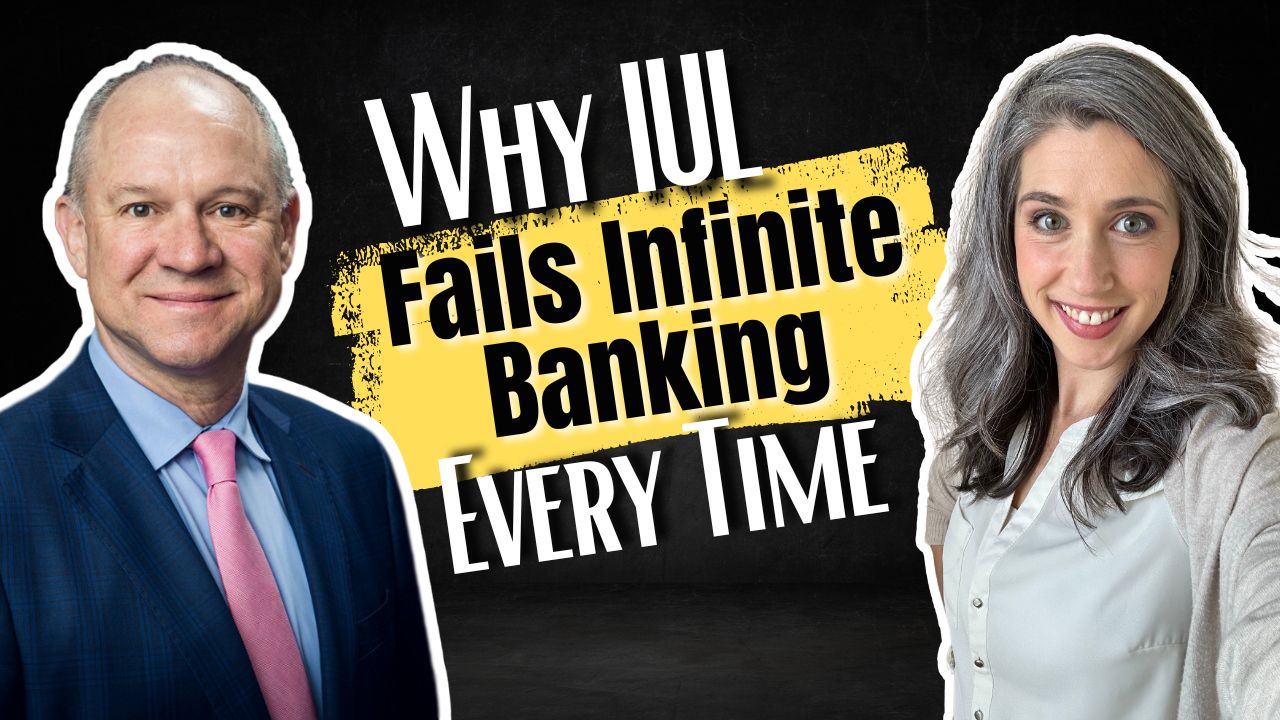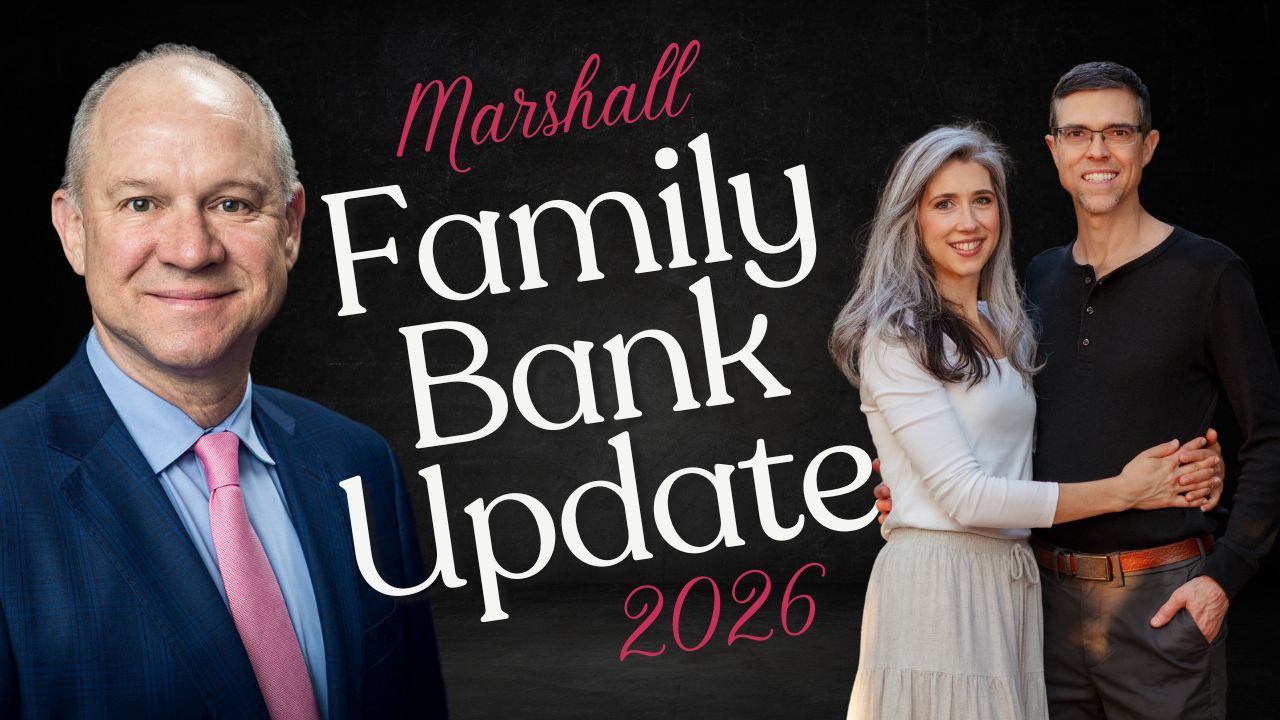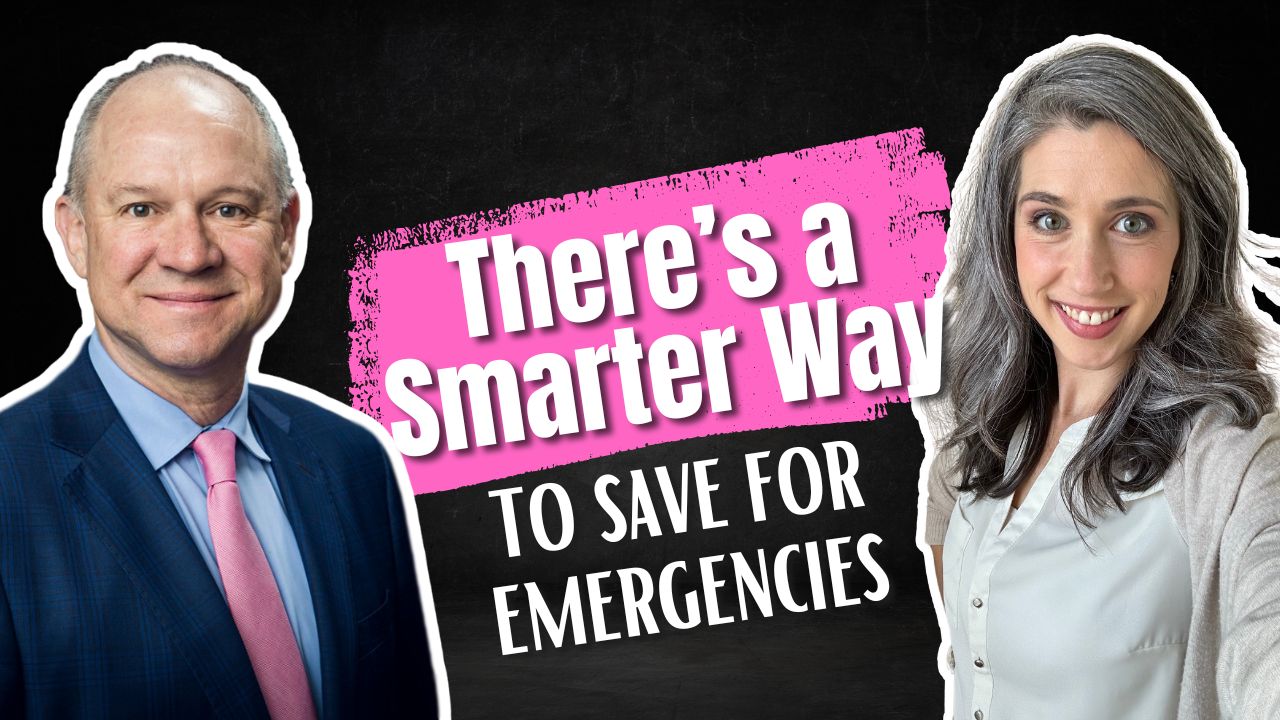
Can You Use IUL for Infinite Banking
Have you ever heard someone say you can use an IUL for Infinite Banking?
Maybe you’ve seen a slick video online, or a persuasive advisor with charts and projections that promise you higher returns, flexible premiums, and “upside potential.” It sounds convincing—especially when you compare the numbers on an illustration. Who wouldn’t want more cash value and lower premiums?
But here’s the sobering reality: when it comes to Infinite Banking, an Indexed Universal Life policy (IUL) doesn’t deliver what matters most.
And that’s a big problem, because Infinite Banking is not about chasing the highest return—it’s about creating a system of certainty and control. If you build your family’s financial foundation on a shifting product with no guarantees, the consequences don’t show up immediately—but when they do, they can devastate your future.
I don’t say this lightly. My co-host, Bruce Wehner, has seen it firsthand. For decades, he has worked with clients who were told their Universal Life or Variable Universal Life would “never fail.” And yet, over time, those policies collapsed under rising costs, vanishing crediting, or shifting assumptions. I’ll weave some of his stories in throughout this article, because you deserve to see not just the theory, but the real-world results.
Today, I want to give you clarity. I want to cut through the confusion and soundbites and show you exactly why IULs cannot serve as the foundation for Infinite Banking, and what you should do instead.
Podcast: Play in new window | Download ()
Subscribe: Apple Podcasts | Spotify | Android | Pandora | Youtube Music | RSS | More
Table of Contents
By the end of this article, you’ll understand:
- Why Infinite Banking requires certainty, control, and guarantees.
- How Whole Life and IUL compare—and why IUL falls short.
- The most common misconceptions about IUL for Infinite Banking.
- Real lessons from history and clients who have lived through these products.
- How to take the next step if you’re serious about building your own banking system.
Let’s dive in.
What Infinite Banking Really Is (and Isn’t)
When people first hear about Infinite Banking, they often confuse it with “just buying life insurance.”
Here’s the truth: Infinite Banking is not about the product. It’s about the process.
At its heart, Infinite Banking is about taking control of your cash flows—those dollars that normally flow out of your life to banks, credit card companies, finance companies, and investment firms—and capturing them inside your own financial system.
It’s about becoming your own banker. And that requires certainty.
Infinite Banking utilizing life insurance only works if you can rely on three things:
- Guaranteed cash value growth – You need to know your pool of capital will increase every single year, no matter what.
- Guaranteed level premiums – You need to know exactly what you’ll owe, so you can plan and build discipline.
- Guaranteed death benefit – You need the confidence that your legacy will be secure for your family, no matter what happens.
If any of those guarantees are missing, you’re not in control. You’re gambling.
This is why Whole Life insurance from a mutual company has always been the proper tool for Infinite Banking. And it’s also why IUL fails the test.
Can You Use IUL for Infinite Banking?
Let’s face the question head-on: Can you use IUL for Infinite Banking?
On the surface, it looks like you could. After all, both Whole Life and IUL are permanent insurance policies with cash value. Both allow policy loans. Both can be designed to accumulate capital.
But here’s the critical distinction: IUL does not come with guarantees.
Yes, illustrations may look attractive. Yes, an IUL may show higher projected cash values based on index performance. But illustrations are not contracts. They are marketing tools.
Bruce tells the story of a very successful businessman, one of our clients, who compared two Whole Life policies side by side. He admitted, “I believe what you’re saying about guarantees, but I just can’t get over the fact that this illustration shows $20,000 more 30 years down the road.”
That was between two Whole Life companies. Now imagine how much more tempting it is when you’re looking at an IUL illustration showing hundreds of thousands more in projected cash value.
But here’s the problem: those numbers are not real. They are based on assumptions about index performance, caps, participation rates, and costs—all of which can (and do) change.
When you strip away the marketing and look at the contractual guarantees, the IUL is a house built on sand. And you cannot build a banking system for your family on sand.
Whole Life vs. IUL: The Key Differences
To really understand why Whole Life works and IUL doesn’t, let’s walk through the key differences side by side.
1. Guarantees
- Whole Life: Guaranteed premiums, guaranteed cash value growth, guaranteed death benefit. Every mutual company in this space has also paid dividends consistently for 100+ years—even through world wars, the Great Depression, and recessions.
- IUL: Minimal guarantees. Some carriers guarantee 0–1% growth, but only over long timeframes (like 10–15 years). Cash value depends on index crediting, caps, participation rates, and rising costs.
Bruce has lived through every iteration. In the 1980s, Universal Life collapsed when interest rates dropped. In the early 2000s, Variable Universal Life faltered after the tech crash. Now we’re in the IUL phase, and history is repeating itself.
2. Premiums
- Whole Life: Level, predictable premiums that never change. This enforces discipline and builds lasting capital.
- IUL: Marketed as “flexible.” You can pay more or less—but underfunding leads to rising costs and eventual policy lapse.
Bruce’s father-in-law is living proof. He bought a Universal Life policy decades ago. Now in his 80s, his premiums have doubled. To keep it alive, he had to slash his death benefit from $25,000 to $15,000. That’s not freedom. That’s heartbreak.
3. Cash Value Growth
- Whole Life: Steady, predictable growth every year, plus potential dividends. Never interrupted.
- IUL: Illustrations show smooth growth, but real-world crediting is interrupted by zeros. Meanwhile, costs and fees still rise, eating away at cash value.
The sales pitch “zero is your hero” sounds comforting, but in practice, it means your cash value is shrinking while you wait for the next crediting period.
4. Loan Provisions
- Whole Life: Simple, straightforward, and always backed by guaranteed cash value.
- IUL: Often complex, with risks of negative arbitrage if loan costs exceed credited rates.
5. Endowment
- Whole Life: Policies endow at age 121, meaning cash value and death benefit converge. Certainty built in.
- IUL: Never endows. Requires ongoing premiums and adjustments.
Why Guarantees Matter for Infinite Banking
Here’s why guarantees are non-negotiable:
Infinite Banking is not about speculation. It’s about stewardship.
If you’re going to build a system that you and your family will rely on for decades, you need certainty. You need to know what your obligations are, what your growth will be, and that your policy will be there for you—no matter what.
With Whole Life, if you do your part (pay the premium), the company is contractually obligated to do their part. With IUL, you carry the risk. If caps change, if costs rise, if crediting falls short—you pay the price.
Risk and control are opposites. Infinite Banking is about control. That’s why IUL for Infinite Banking doesn’t work.
Common Misconceptions About IUL for Infinite Banking
“IULs never lose money.”
False. IULs may not lose money due to index crediting, but cash value can decline because of rising mortality costs and policy fees.
“IULs have more upside.”
Illustrations often show higher returns, but those are projections—not promises. Real-world performance is unpredictable.
“IULs are more flexible.”
Flexibility sounds attractive, but underfunding leads to higher costs and potential lapse. What looks like freedom is really a trap.
Lessons from Real People
Bruce has seen countless clients burned by Universal Life products. The story is always the same: things look good in the beginning, when costs are low and illustrations are rosy. But 20 or 30 years down the road, when mortality costs rise and crediting falls short, the policyholder is left holding the bag.
And it’s not just numbers on a page. These are families. These are people who trusted that their policy would be there for them—and now, in their later years, they are scrambling to cover skyrocketing premiums or watching their policies collapse.
That is not the future we want for you.
The Bigger Picture: Stewardship and Legacy
Infinite Banking is not just about money. It’s about stewardship, legacy, and freedom.
When you build your family’s banking system on Whole Life insurance, you’re not only creating guaranteed capital for yourself—you’re building a foundation your children and grandchildren can rely on.
But if you build that system on IUL, you’re creating uncertainty. You’re handing your family a financial time bomb that could explode years down the road.
The Answer to the IUL Myth
So, can you use IUL for Infinite Banking?
No.
Infinite Banking requires guarantees, certainty, and control. Whole Life insurance provides those. IUL does not.
If you’ve been told otherwise, I encourage you to look past the hype and the soundbites. Look instead at history, principles, and the track record of mutual companies that have paid dividends for over a century.
That’s where true financial freedom is found.
Book A Strategy Call
If you are serious about Infinite Banking, don’t gamble with IUL.
Book a call with our team at The Money Advantage. We’ll walk with you, review your policies, and help you design a system that gives you certainty, control, and peace of mind—for you, and for generations to come.
Your financial future deserves guarantees, not guesses.
We offer two powerful ways to help you create lasting impact:
- Financial Strategy Call – Discover how Privatized Banking, alternative investments, tax-mitigation, and cash flow strategies can accelerate your time and money freedom while improving your life today. Let us show you how to align your financial resources for maximum growth and efficiency. Book a Strategy Call with our team today.
- Legacy Strategy Call – If you want to uncover your family values, mission, and vision, and create a legacy that’s about more than just money, we can guide you through the process of financial stewardship and family leadership. Save time coordinating your family’s finances while building a legacy that lasts for generations. Book a Legacy Strategy Call to learn more about how we can help.
We specialize in working with wealth creators and their families to unlock their potential and build a meaningful, multigenerational legacy.
FAQ: IUL for Infinite Banking
Can you use IUL for Infinite Banking?
No. IUL lacks the guarantees required for Infinite Banking. Whole Life is the only proper tool.
Why does Infinite Banking require Whole Life insurance?
Whole Life provides guaranteed premiums, guaranteed cash value growth, and guaranteed death benefits—foundations IUL cannot match.
Do IULs really offer more upside?
Illustrations suggest higher returns, but in practice, rising costs and fees often erode that performance, because many people do not have good money habits.
What happens if I underfund an IUL?
Underfunding leads to rising insurance costs and potential policy lapse. Flexibility quickly becomes a liability.
What’s the safest way to start Infinite Banking?
Work with an experienced advisor who understands Infinite Banking and uses properly designed Whole Life policies from a mutual company.
Marshall Family Banking System Case Study: In-Force vs Original Illustration (Part 6)
The moment we realized “liquidity” isn’t a theory Thirteen years ago, Lucas and I thought we were being responsible by storing a lot of our capital in gold and silver. It felt safe. It felt timeless. It felt like the kind of move people make when they’re thinking long-term. And then we needed cash. Not…
Emergency Fund Alternatives: Liquidity That Protects Your Family—Without Sacrificing Growth
The Day the “Emergency Fund” Met Real Life Rachel here. Many tell us the same story: “I saved the emergency fund, but I’m worried I’m losing ground to inflation and missed opportunities.” Because for most people, the “emergency fund” is a lonely pile of cash—stuck in a corner doing next to nothing. It feels safe,…




